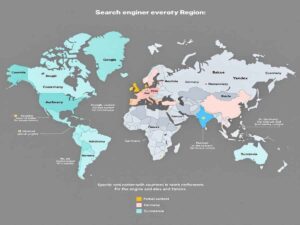The Impact of Cultural Differences on SEO Strategies

How do cultural differences impact SEO and why should businesses be aware of this? Global markets are getting more and more intertwined, so adjusting your SEO strategies to a certain culture is extremely important. Companies seeking international growth will soon discover that a “one-size fits all” approach doesn’t work in SEO.
This is a blog about how cultural differences affect SEO knowledge, and what practical takeaways can help businesses cater to different markets. Whether you are an SEO practitioner, a digital marketer or a business owner, you are going to view how you can optimize for a worldwide audience in a new light.
Understanding Cultural SEO Strategies
Cultural SEO is the practice where optimization techniques are customised to cater the culture norms and habits of each audience you are targeting. While traditional SEO is mainly focused on keywords, backlinks, and technical aspects, cultural SEO is about thinking beyond these components and considering factors such as search intent, user behavior, and contextual relevance across regions.

How Search Behavior Differs Across Cultures
Search behavior is influenced by culture in numerous ways:
- Search Intent: In many societies, some users will want long answers to their searches, but then there are other societies who would like fast answers. For example, Latin American audiences tend to prefer narrative and longform content over straight how-to guides.
- Preferred Content Types: Visual-heavy societies may favour infographics and video content, whereas text-heavy cultures often go for blog posts or articles.
- Linguistic Nuances: Regional slang, idioms and phrases, influence keyword research and make prioritization necessary. For example, how Americans say “vacation” as opposed to how the British say “holiday.”
Cross-Cultural Marketing’s Role in SEO Campaigns
Cross-cultural marketing is the new cultural SEO. This entails learning about and honoring cultural norms and integrating them into your SEO plan. The style of your content might need to be too formal for some cultures, casual and chatty for others. When you match your cultural understanding with your SEO then you are going to excel at better engagement and performance on Google.
The Role of Localization in SEO
Localization is the process of making your content, marketing, and SEO work suit the local culture and preferences. It’s not just about translation, but a blend of language, culture and even emotional triggers that make content real in a different market.
Regional SEO Variations
Every market has its nuances:
- Content Creation: Some areas, such as Germany, have much longer, more formal and more detailed product descriptions. Scandinavians, meanwhile, prefer simplicity and brevity.
- Search Engine Dominance: Google is the world’s leading search engine but other countries such as China have Baidu as its major search engine and Russia has Yandex. So that means your SEO strategies need to cater to the individual algorithms and ranking considerations of each search engine.

The Importance of Multilingual SEO
Multilingual SEO is one of the most important localization attributes. It is about making your site multilingual so that it can be more accessible to all. But companies should also be wary of literal translations that may not take culture into account. Applying this information lets us delve further into the idioms of different cultures, as a word with positive connotations in the US could have a very negative sense in other English-speaking countries. Precise and culturally appropriate translations are crucial for effective multilingual SEO.
Key Cultural Factors That Impact SEO
It’s important to know the connection between culture and its impact on user behavior in order to inform an SEO strategy. Here are some of the cultural details you’ll need to take into account:
Language and Translation
Keywords do not transfer seamlessly from language to language. For example:
- American English vs. British English: In the US, “apartments” are “flats” in the UK.
- Sentence Structure: Other languages have longer and more explanatory words which will take more sophisticated word algorithm method.
The local speech patterns had to be the same as a person’s natural search activity.
Search Engine Preferences
- Google may rule the earth when it comes to SEO, but in China Baidu is king, and Naver rules the roost in South Korea. Every platform has different algorithms and ranking factors. For example, Baidu prefers. cn domains, and considers backlinks from other Chinese sites more than Google.
Knowing these preferences is crucial to a successful SEO strategy in certain parts of the world.
Cultural Sensitivity
There is a huge range of cultural taboos out there, and what flies in one market could offend in another. For instance:
- The Japanese prefer polite and respectful tones when it comes to marketing material.
- Content that does not offend religious sensibilities may have a better appeal to Arabic-speaking countries.
Having your finger on the pulse when it comes to local cultural sensibilities is the difference between not going up the down escalator and capturing the public’s imagination.

Adapting SEO Techniques for Global Audiences
Global SEO can never be one-size-fits-all, especially for businesses based in multiple countries. Instead, it requires a nuanced strategy that includes universal and region specific considerations.
Practical Steps for Adapting Techniques
- Regio-specific keywords: Research and identify the keywords that reflect local terminology and cultural inclinations.
- Custom Meta Descriptions: Write meta descriptions which are going to attract local markets. Communicate in a language, tone and cultural references that are appropriate for the audience.
- Culture Content Happy: Take note of how the changing seasons, special days, and cultural beliefs will influence what you post and when you post it.
Real-World Example: Adapting to New Markets
A worldwide e-commerce brand new in the Arab market adapted its launch approach to include Arabic translations and regional payment options. The company experienced a 40% surge in organic search traffic after they adopted region-sensitive SEO.
Multilingual SEO and Its Importance
Why Multilingual SEO Matters
If you’re serious about growing your business on the global stage, multilingual SEO is no longer a choice. It is a way to build trust with non-English-speaking audiences, offering them a product that feels familiar and relatable.
Challenges in Multilingual SEO
- Precise Keyword Translation: We shouldn’t merely translate the keyword; we need to consider the user’s intent. For instance, although “cheap phone” might fly in English, small tweaks — “affordable phone,” say — often soar in other languages.
- Duplicate Content Risks: Copying and pasting will be punished by search engines. You also need to make sure your translated pages are unique and cultural and not copied word for word.

Best Practices for Implementing Cultural SEO
Here are some best practices to effectively put cultural SEO strategies into practice:
- Get Into Regional Tendencies: Study online content, you’d be surprised how people interact with it depending on location.
- Design for the user: Customize your site’s UX/UI to fit cultural aesthetics (e.g., color preferences, reading direction or layout styles).
- Local Link Building: Try to gain these backlinks from local influencers, directories, or businesses.
- Stay Updated: Trends change! Frequently add to and refresh your content to capture what is new and relevant in your markets.
Tools and Resources for Cultural SEO
There are a few tools that can help make localising SEO for different cultures that bit easier:
- Google Analytics was used for monitoring the regional users surfing trend.
- SEMrush for localized keyword research.
- DeepL for good quality translation with cultural subtleties.
- Google Trends to determine regional search interest.

Adapt, Optimize, and Thrive
The Differences In SEO In Different Cultures While the key concepts – such as relevance, trust, traffic, and engagement remain at the heart of SEO – techniques, strategies, and tactics are all heavily influenced by cultural differences. You can take your optimization to this whole new level by adding localization, multilingual SEO and deep cultural understanding!
With a grasp on cultural SEO under your belt, here are 9 actionable tips to master global search rankings. Sign up for our blog if you want to go even more in depth with global SEO, or download our ebook on Multilingual SEO Best Practices if you want to optimize for international success now.





